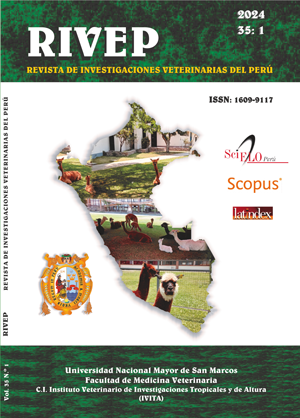Efecto del suplemento Insulina-Transferrina-Selenio (ITS) sobre la tasa de desarrollo y calidad de embriones bovinos in vitro
DOI:
https://doi.org/10.15381/rivep.v35i1.25348Palabras clave:
estructuras embrionarias, insulina, transferrina, selenito de sodio, especies reactivas de oxígenoResumen
El estudio tuvo como objetivo evaluar el efecto del suplemento Insulina-Transferrina-Selenio (ITS) en el cultivo embrionario sobre la tasa de blastocistos y calidad embrionaria. Los cigotos de bovino obtenidos por maduración (MIV) y fertilización in vitro (FIV) fueron transferidos a medio Evolve en 4 grupos (T1: Sin suplemento ITS; T2: ITS las primeras 48 h de cultivo (CIV1): T3: ITS después del día 2 de cultivo (CIV2), T4: ITS todo el tiempo de cultivo (CIV1 + CIV2). Todos los procedimientos se realizaron a 38.5 °C, 5% de CO2 y 90% de humedad relativa. Las tasas de clivaje y de blastocistos se determinaron a las 48 h y día 8 de cultivo, respectivamente. El número de células totales y la producción de especies reactivas de oxígeno (EROs) en los blastocistos expandidos fueron determinados por tinción del núcleo con Hoechst y la oxidación de la sonda fluorescente diacetato diclorodihidrofluoresceína (H2DCFDA). Los embriones cultivados de T4 presentaron la mayor tasa de blastocistos (32.6%) y número de células totales (145.6) comparada al grupo control sin ITS (26.2% y 98.6, respectivamente; p<0.05). Asimismo, la producción de EROs en los blastocistos de T4 fue menor (p<0.05) que la obtenida en los demás grupos de estudio. Los resultados demuestran que la adición del suplemento ITS durante todo el tiempo de cultivo embrionario tiene efectos benéficos sobre el porcentaje de blastocistos y calidad embrionaria, valorada por el número de células totales y la producción de EROs.
Descargas
Descargas
Publicado
Número
Sección
Licencia
Derechos de autor 2024 Mariano Eliécer Acosta Lobo, Pablo Andrés Robledo Salgado, Luis Fernando Londoño Franco, Viviana Andrea Torres Osorio, Neil A. Vásquez Araque

Esta obra está bajo una licencia internacional Creative Commons Atribución 4.0.
LOS AUTORES RETIENEN SUS DERECHOS:
a. Los autores retienen sus derechos de marca y patente, y tambien sobre cualquier proceso o procedimiento descrito en el artículo.
b. Los autores retienen el derecho de compartir, copiar, distribuir, ejecutar y comunicar públicamente el articulo publicado en la Revista de Investigaciones Veterinarias del Perú (RIVEP)(por ejemplo, colocarlo en un repositorio institucional o publicarlo en un libro), con un reconocimiento de su publicación inicial en la Revista de Investigaciones Veterinarias del Perú (RIVEP).
c. Los autores retienen el derecho a hacer una posterior publicación de su trabajo, de utilizar el artículo o cualquier parte de aquel (por ejemplo: una compilación de sus trabajos, notas para conferencias, tesis, o para un libro), siempre que indiquen la fuente de publicación (autores del trabajo, revista, volumen, numero y fecha).










